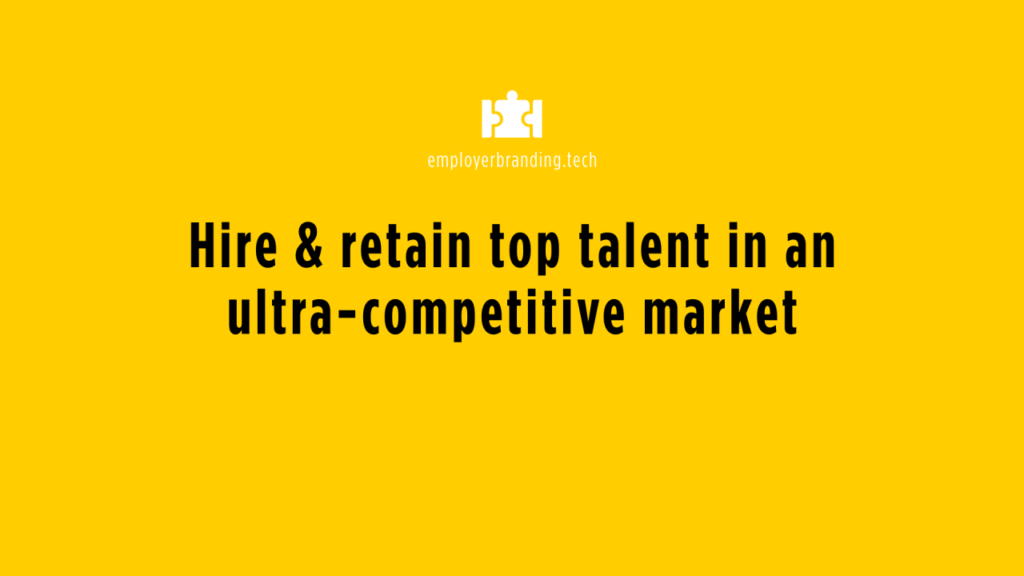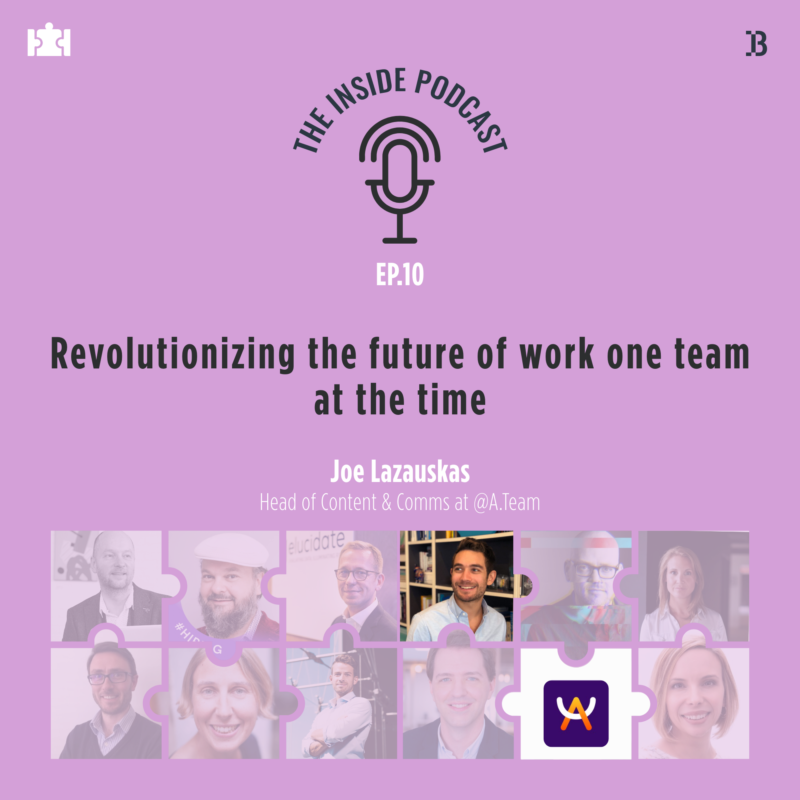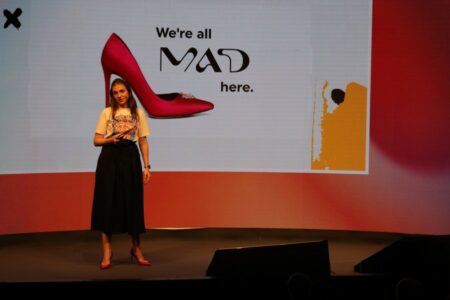Hi! My name is Georgiana. I am the CEO and founder of Beaglecat, and soon you will be listening to Employer Branding: The Inside Podcast. In this podcast, I regularly talk to employer branding managers, talent acquisition managers, and human resources managers in tech companies in Germany, Romania, and the US. For more content on employer branding-related themes, go to employerbranding.tech or beaglecat.com. Stay tuned.
Overview
Ep. 10, the last of #EmployerBranding: The Inside Podcast, Season 5, is now live!
In this episode, we’ve had the pleasure of speaking with Joe Lazauskas, Head of Content & Comms at A.Team. We talked about the power of #teams and how people form bonds together, but also about the builder economy, #purpose, #mission, and how storytelling strengthens company culture.
What you’ll learn by listening
- The power of teams & how people form bonds together
- How work is experienced through teams, not companies
- A different perspective on the new way of work
- An overview of the builder economy, the successor to the “gig” economy
- Where does purpose fit into the new way of work
- What makes great teams come together
- Why storytelling matters when strengthening company culture
About A.Team
A.Team is the first members-only network of the world’s top engineers, product managers, designers, and marketing talent, designed to help growing companies accelerate product development through the power of great teams. A.Teamers come together as cloud-based, modular teams on our team formation platform to work on problems they care about for forward-thinking companies—with the freedom, flexibility, and autonomy they crave.
Over the last two years, we’ve grown exponentially — scaling to over 5,000 independent builders and over 250 teams deployed on missions across 35+ industries for startups, mid-market and public companies. A.Teams are building the future of vaccine manufacturing for Apprentice, the next generation of education on mobile for McGraw Hill, a revolutionary model for brick-and-mortar with Blank Street, and much more.
We’re creating a new builder economy that will transform the way people work and companies build, and we’ve brought together an incredible team of people to help us do that—raising a $55 million Series A with investors like Insight Partners, Tiger, and Spruce House; future-of-work pioneers like Adam Grant, Dan Ariely and Joseph Fuller; and cultural leaders like Jay-Z’s RocNation, and founders and execs from CAA, Apollo, Upwork, Fiverr, and SpaceX.
Podcast link – Enjoy listening on Spotify!
Podcast transcription – Employer Branding T.I.P S05Ep.10
Georgiana:
Hi, everyone! This is Georgiana with a new episode of Employer Branding: The Inside Podcast. Today I’m talking to someone that I’ve admired for a very long time, and whom I actually managed to meet in person about four years ago in the US. His name is Joe Lazauskas. Am I pronouncing this correctly? He is a communications & storytelling expert, now Head of Communication and content at A.Team. Joe has worked for a very long time at Contently, which is one of the companies that taught me most of the content marketing that I know and practice today. Welcome, Joe! Thank you so much for agreeing to talk to me today.
Joe Lazauskas:
Thank you for having me. Yeah, that was a very kind of intro. Four years ago at Collision seems like decades ago, after the last couple of years. It’s great to see you again. I’m excited to dive into all of your questions.
Georgiana:
Please, first of all, I’m really curious to know, how come the change after so many years at Contently?
Joe Lazauskas:
Well, you know, The Great Resignation was such a trend. And I was just honestly feeling left out, and felt like I had to get on it. Eight years at a company is a really long time, right? It’s almost a weird time to spend in a tech company. And I loved Contently. I got to play a lot of different roles there. I started out, originally, as their Editor in Chief, as I was leaving the journalism world. I got the chance to spend a lot of time putting together all of that content that I guess taught you about content marketing.
Then I got to go to the client side, and I started our content strategy department and division, which really became one of the big pillars of content leads business. And that was sort of amazing to take on that intrapreneurial type of opportunity and build a line of business and a P&L from the ground up. And that way, I started building a services business inside of Contently.
And then, my last few years, I spent running marketing, which is another interesting challenge, being a journalist running a media company, not knowing a ton about marketing when I came into a lot of people leaving media, we’ll consider sort of the dark side, going and working on content for a tech grant; although Contently was a company started by journalists with incredibly strong values around content and the integrity and their storytelling, which made it a lot easier.
But then getting to really scratch that edge of running all of the marketing for a brand was really, really valuable in kind of a similar role here at A.Team. I’ve discovered that as much as I love content, I love a lot of the other aspects of marketing, as well. But after a certain point, it’s time for a change. I really want to stay during COVID, to make sure that the company got through the pandemic. I think that was an instinct of a lot of the executive team that had been there for a long time. We really want to be there for each other through this time, and for the team to make sure that the company’s really healthy on the other side. But then I met Rafael, the CEO of A.Team.
And I was just pretty blown away by his vision for really transforming the future of work. I’ve long been pretty obsessed with the dynamics of teamwork. In human evolution in history, there’s a lot of intersection with the power of storytelling. When you look at the power of teams and how they come together and how we form bonds with one another. So getting to explore that really deeply. And think about how we revolutionize what is the central unit of work today, which is the team, right?
Like we experience work, not through our companies, but through our teams when work is really great. It’s when we have a great team around us. Not just because we excel or we have benefits but about the way we experience work in a joyous way, on a moment-to-moment basis with the team. So getting into work at a company that’s really rethinking how we form teams in this new world of work just started to be too compelling to pass up. So I made the leap.
Georgiana:
It does sound this way anyway. And I’m really looking forward to you telling me more about how this company works and how the business model really functions, and how employer branding can exist and thrive in such a context. But first of all, maybe you could tell us exactly what A.Team does. I found this article in The New York Times saying that A.team wants to be a marketplace for renting skills instead of buying. How so?
Joe Lazauskas:
Yeah, so the fundamental idea around A.Team is that over the last few years, we’ve seen this movement of really talented product builders sort of getting a little bit disenfranchised with the traditional one job one role work model; being at Facebook for another year, optimizing an ad server for another year, and wanting to go out and work on things that really matter to them, you know, with the freedom, autonomy, flexibility at the table, still getting paid really well.
A.Team is a network of about 50,500 of the world’s top vetted product builders, that we form into teams using our team formation platform and team formation engine to solve really interesting problems that cutting-edge tech companies bring to us. We’re invite-only and members-only on both sides of the equation. Yeah, so obviously, you have to apply or get referred and get vetted off the waitlist to join the network. And there’s a very stringent vetting and interview and technical skills process in that.
But what’s really unique about A.Team is that we’re actually invite-only on the client side as well. You have to have a really interesting initiative that you’re bringing to our network to get into the network and to get matched with an A.Team from our platform. So that’s in a nutshell, and basically what this enables for the workers is that you can rent your skills, right? As part of the team on the things that are really interesting to you. Because so much when we come into a job, in the normal way of work, right?
There’s something that is really intriguing that the initial thing that we’re going to do at that job, right? I’m going to solve the x problem. But maybe that doesn’t endure, right that but then we’re still at that job. And we’re like, Alright, I’m just going to solve this out, I’m going to wait till I, that’s my one-year cliff of equity. And then people might leave again. That’s part of the reason that we see so much turnover in tech. A.Team is fundamentally this idea of a different way of working, where you have a team that you’re working with pretty consistently on different projects, or different iterations of the team based on the problem you’re going to solve. And you can pick the missions and initiatives that are most interesting to you.
And we see those might last for three to six months, they might last for six to 12 months, some clients, they’re still working with their a team, you know, we’re only about two years old, they’re still working with them two years later. But it gives much more flexibility and optionality to the workers to work on stuff that really, really interests them; potentially work on multiple projects at once that really interest them with a ton of financial security and empowerment that comes with it. Because we maintain really high rates for the network. We only accept the best of the best, and we’re only working with clients that are looking to, you know, pay well and fairly for top talent.
Georgiana:
Do you really think this has the potential to become the new way of working? Isn’t that too bold, maybe?
Joe Lazauskas:
I do but I don’t think it’s gonna become the new way of working for everyone. I don’t think that absolutely everyone is going to decide that they don’t want a full-time job. I’m just gonna be independent. I have a full-time job. I work at A.Team full time. But what I think we will see more and more, is my prediction of how companies are structured in about eight years in 2030. Let’s look into our crystal ball. You’ll see a lot more companies that have a smaller nucleus of full-time employees.
And then they’re leveraging an independent workforce based on the initiative of what they’re trying to do and what they’re trying to build. And sort of scaling those resources up and down, because this is the direction that we see everything headed. We see more and more people freelancing every year. And it’s not just you know, low-skilled gig workers that are going in this direction. We see a lot more highly skilled workers going independent every year. Because there’s a certain type of person. McKinsey actually has had a big report where they identified this persona of like this 25 to the 45-year-old, highly skilled person who is ditching traditional work as like the do-it-yourselfer.
This type of person finds this model really appealing, right? I can go and work on the things that really matter to me. And so this is a really growing talent pool that companies can tap into, you can access people that you probably couldn’t hire otherwise. If you’re tapping into those folks, you’re getting a competitive advantage over other companies in your arena who aren’t tapping into this talent pool. And so we’re only seeing this grow and grow and grow.
And my prediction is that in 2030, we’ll see a lot more companies that have those smaller nuclei as full-time, employees. And then they have teams of independent workers or individual freelancers that they’re working with regularly. But you know, one month, it might be 40 hours a week, because you’re trying to ship a particular feature, the next month, you might not need, say as many product management resources on that initiative. So you’re gonna scale it down, and then that person will pick more work back up from somewhere else. But that’s why ecosystems, like A.Team are really important; to give workers the ability to actually manage their workload and constantly be easily finding interesting things that they can work on.
Georgiana:
And you’re saying that you have people working with the same client for two years now. Does that mean they managed to somehow fit into the company culture? How did this happen? I’m trying to understand where the company culture goes, and how the team dynamic happens in the end.
Joe Lazauskas:
What we’ve seen works really well is when the company just fundamentally doesn’t really treat the independent worker differently than the full-time worker and how they ingratiate them into the team. Yeah, you’re out on a W two versus a W nine, right? If you’re in the US, but really shouldn’t matter how you treat a team member and how you welcome them in. I would argue that a lot of the issues with freelancing to date that we see is that companies treat freelancers not as members of the team, but just as like I’m hiring you to do this thing. Don’t ask questions. Don’t give your opinion. Right? What do you know? Right? But why? If they’re really talented if they bring new perspectives to your company, why would you reject welcoming them in and bringing that diverse perspective, that cognitive diversity to the makeup of your team, it’s illogical?
So the companies that we see are working with their A.Team for a really long time, what they’ve done is basically welcomed them as a part of their team. For some companies, it’s early-stage startups, where an A.Team was actually their founding engineering and product team, which is a really interesting use case, consider spending six months hiring your team and then building your product, just get in A.Team and, you know, less than 10 days, and then you start building your product. In other cases, they’ve just become a part of that product and engineering org.
We have a customer apprentice that came to A.Team, when they needed to build an entirely new version of their health tech platform to power the distribution of hundreds of millions of COVID vaccines because they realize to work with all different healthcare operators in their ecosystem. They had to basically rebuild a ton of their platform from scratch. And the way they were able to do that is they brought on a massive A.Team of 20 plus people, who were able to get it done in the 45-day window.
And then they just kept growing the team and now they work with over 58 A.Team-ers. And it’s about half of their project engineering org overall. And they just don’t treat those folks any differently. They send them computers for compliance reasons, they are part of their stand-ups. They’re part of their company culture and outings. We do the same thing at A.Team. Right before we came out of stealth in May, we had a company summit in Portugal. And we brought the A.Team-ers that we work with. About half of A.Team is independent at emerge, and it’s about half full time. And so basically, if you’re working with A.Team for a substantial amount of time, I think our you know, our dividing line was like 15 or 20 hours a week, we would pay for you to come to the summit because you’re part of the team like just because your employment status is slightly different doesn’t mean that we want to treat you differently that way or not have your perspective as we’re getting together in person for the first time and solving a lot of these really big problems.
Georgiana:
There’s a lot of talk about the builder economy, on your website. What is it exactly?
Joe Lazauskas:
So the builder economy I see as the successor to the gig economy. The gig economy had a lot of good ideas, but it’s ultimately been really commoditizing. We think about this new identity of the builder, right? Like someone who builds stuff, you’re great product engineering talent, you build things. Even in marketing, I would argue that all you’re doing is building things and building content programs and building demand gen programs, and building a brand.
But for people who consider themselves really talented builders, like you don’t want to be caught dead on most of the gig economy platforms out there. If you saw me on Upwork you might have been like, oh, man, I thought Joe is, you know, pretty talented. It would make a good podcast guest, but maybe not now. And so, what does actually a new economy for builders look like? How do we enable that, empower that? And I think it’s going to be one in which we see highly skilled builders coming together, often working as teams for very mission-driven high-order initiatives for companies.
So think of it as like that next evolution of the gig economy where like, we saw the Creator economy that empowered creators to really go out and craft the autonomous careers that they wanted. I think now we’re seeing the mechanisms being put in place for builders to take on that same self-autonomy, and that same empowerment, and build really fulfilling independent careers for themselves. There’s a lot of data and trends that point to this, both research that we’re about to release and things you’ll see from McKinsey. And actually, I’ll give up work a shout-out, they do some really good research on this as well. And I think it’s only going to grow.
Georgiana:
This sounds extremely visionary, I’m really looking forward to seeing how it develops over time. I’m wondering because this to me, sounds really interesting. It’s almost science fiction, in a way, everything you’ve told me so far. Where does purpose go? Do people working for clients follow the purpose of A.Team, while at the same time thinking of the client’s purpose? How does it go in their mind?
Joe Lazauskas:
I think that purpose is at the core of it. Every initiative on A.Team, we call it a mission. And, essentially, clients, when they get accepted at A.Team have to lay out the mission for what they want to build. We had them fill out a certain set of questions; they film a video to put out to the network. And what is attracting those builders from our network is the mission that the client is putting out there; the purpose of what they want to build and why they want to build it.
So like give you an example. We’re working with McGraw Hill; a 150-year-old legacy publisher. Most of people know McGraw-Hill for textbooks. But they attracted some of the best builders in our network because they had this mission where they wanted to basically reimagine education on mobile for the smartphone, like TikTok and Instagram for Gen Z. They got the product designer who designs the original swipe on Tinder, and were done on the early breakthrough versions of iOS to do this. Because they had a really strong mission that attracted people. That’s really, really cool. This is why we see that purpose is not less important in this new world of work, it’s actually more important. If you want to get these highly skilled folks that have left traditional big tech jobs. It’s the mission that’s going to attract them forward.
Georgiana:
It’s the same amount of money regardless of where they work. That’s what makes the difference,
Joe Lazauskas:
Yeah, it’s the mission. I would also say that we think about what makes great teams come together, right? It’s the mission. Having shared values, and a shared vision is what unites us as humans. Like as humans, we were not able to stick together in bands really more than 40 to 140 in early human history, right, until we developed the ability to have a complex spoken language, at which point in which we could tell stories that would unite us in much larger groups along much greater service areas. I think you’ll see the same dynamic in teams today where we may be distributed all over the world. We may not be in person all the time, but the thing that can unite us is a shared story about where we’re going to go together; what that purpose is. Um, so yeah, I think that purpose has never been more important than it is right now.
Georgiana:
And does the purpose of A.Team also play a role in attracting people to the platform in the first place?
Joe Lazauskas:
I think so. I mean, I think ultimately what people want is if you are an independent builder, you want to work on cool shit with awesome teammates, and get paid well to do it. That’s what you want at its core. And so often, it’s that vision of what a team can give you. Right? That is our purpose. We are a builder-first company, we want to serve builders, with every decision that we make. I think that comes through to our community, and that attracts them to apply in the first place.
But it’s also the missions of the companies that they’re going to work with. That’s really attracting them as well because that’s the product that we’re selling to the builder communities that you’re gonna get cool stuff to work with. So I think it’s both at the same time, it’s the mission of a team. And it’s the mission of the companies that we work with. I think in terms of attracting clients, that mission definitely resonates with people. But then it’s also the fact that they get to work with really amazing teams of product builders. That’s also what’s attracting them there.
So it’s sometimes hard to separate. But yeah, I definitely think the mission is something that attracts a lot of people into our universe and makes a team they want to be a part of, I mean, it certainly was a big thing that attracted me there. I was not going to take a job that I didn’t agree with because I wasn’t really motivated by the mission of that company. That, for me, is like a non-negotiable aspect of anyone that I would work for.
Georgiana:
I’m really happy or saying this because I think in the end, mission and purpose also mean story. And I talk a lot about storytelling during this podcast and I talk a lot about creating your company’s story for my clients and to our clients whenever we have a recruitment marketing campaign. Or simply when we consult an employer branding. And since you are the storytelling expert, and I have you on this podcast, I would like you to also state why storytelling is important for a company and for strengthening company culture, creating a company culture in proving your brand as an employer, or whatever else reason you might find suitable.
Joe Lazauskas:
Yeah, absolutely. First, on the on the mission note, I will plug that the new future publication we just launched is called Mission and is filled with a lot of great stories. So everyone should have their A.team-Mission. But yes, why does storytelling matter? As humans, we’re hardwired for stories. When you think about it, when we are children, we exist in a world of stories we’re constantly living in Neverland. When we go to sleep at night, the brain keeps itself up telling itself stories.
Neuroscience has shown that the neurons in our brain, and our neural activity literally lights up like a switchboard is illuminated in the city of our minds. When we hear a great story, it’s so engrained into who we are, into how we bond with each other, into how we communicate, that you cannot extract storytelling from what truly motivates people in this world. What motivates your team, what motivates your employees? What creates that emotional impulse that makes your clients want to choose you over the dozens of competitors that could go otherwise? It’s such a core part of who we are, that if you were to have a business that ignored storytelling like I don’t even know how that would work. Like maybe it’s a local, like plumbing or gravel business that can do that. You’re telling stories when you go to the client’s house, you’re building that relationship. Storytelling is a part of that. So if there’s a business leader today that thinks that storytelling doesn’t matter at all, I would love to know how they got to where they are without telling any stories.
Georgiana:
Yes, I think you’re totally right. And just to reach the end of this podcast, I have one more question, how much actual storytelling or structured if I can call it this way, storytelling do you do in this new role? This new company?
Joe Lazauskas:
Yeah, I think I do a lot. I think that everything ties back to the story that we’re telling in one way whether we’re designing an advertising campaign or I’m working on a big research report, as I’m doing right now. Or we’re thinking through our product marketing and positioning and how we develop sales enablement, materials like story assets are at the heart of everything that you do. So there’s a lot of storytelling always in everywhere.
Georgiana:
Glad to hear that, then there is hope for everybody. Joe, where can people find you and read all the content that you provide?
Joe Lazauskas:
Yeah, so you can explore our new future of work publication if you found this podcast interesting at a.team-mission. You could find me on LinkedIn search Joe Lazer, if you don’t want to type out Lazauskas. That’s what a lot of people know me as. You could subscribe to my newsletter, The Storytelling Edge on the art and science of storytelling and communication. That’s been surprisingly great, a great community that we felt there with about 140,000 marketers subscribed. And you can check out my book The storytelling Edge, if you want a really deep dive into this it’s a fun read. There are a lot of great stories in it. It’s written so that you can finish it in a cross-country flight with still some time to watch an episode of Grey’s Anatomy or 30 Rock. So yeah, please check it out.
Georgiana:
Interesting picks and yes, I can also confirm this book has helped me a lot in better understanding how storytelling works and how I can use it for my clients and for my business. Thank you so much for talking to us today. All the best at A.team and in helping other people, and I hope to meet you again at some point.







